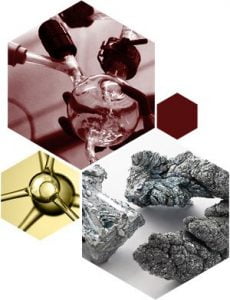
Yttrium (III) Nitrate Hydrate
Properties
- We can offer items in bulk or custom. For other quantities or purities, please request a quotation.
- All prices are subject to change.
Related Products
Information about Yttrium (III) Nitrate Hydrate / CAS 10361-93-0
Yttrium (III) Nitrate hydrate (Y(NO₃)₃·XH₂O) is a water-soluble rare-earth compound with multiple applications in advanced material synthesis, as well as specialty applications in electronics and biomedical research. Its high solubility and reactivity make it an essential precursor for producing high-purity Yttrium Oxide (Y₂O₃), which is integral to many industrial and scientific applications. The controlled thermal decomposition of Yttrium Nitrate allows for precise Y₂O₃ formation, ensuring superior performance in various fields.
In materials science, Yttrium Oxide nanoparticles synthesized from Yttrium Nitrate exhibit exceptional thermal stability, optical transparency, and electrical insulation properties. These characteristics make them suitable for high-performance ceramics, optoelectronics, and laser applications. Y₂O₃-based materials are widely used in the development of luminescent phosphors for LEDs, enhancing energy-efficient lighting technologies. The compound’s unique ability to produce defect-free thin films further strengthens its role in microelectronics and photonics.
Yttrium (III) Nitrate hydrate is also a crucial precursor in sol–gel synthesis, facilitating the deposition of Y₂O₃ thin films. These films serve as high-quality dielectric layers in semiconductor devices, particularly in gate dielectrics for field-effect transistors (FETs). When subjected to ultraviolet (UV)/ozone treatment, these films achieve uniform, defect-free morphologies, improving their dielectric properties—essential for next-generation flexible electronics and display technologies.
The aerospace and energy industries benefit significantly from yttrium-stabilized materials. Y₂O₃, produced from Yttrium Nitrate, is incorporated into thermal barrier coatings and structural ceramics, enhancing the high-temperature resistance of aerospace components and turbine blades. These coatings protect against oxidation, thermal shock, and wear, prolonging the operational lifespan of jet engines and industrial gas turbines. Furthermore, yttria-stabilized zirconia (YSZ), derived from Yttrium precursors, is widely utilized in solid oxide fuel cells (SOFCs) due to its superior ionic conductivity and stability under extreme conditions, making it a key material for sustainable energy solutions.
Safety
- H272 May intensify fire; oxidizer.
- H315 Causes skin irritation.
- H319 Causes serious eye irritation.
- H335 May cause respiratory irritation.
- P210 Keep away from heat/sparks/open flames/hot surfaces. — No smoking.
- P220 Keep/Store away from clothing/.../combustible materials.
- P221 Take any precaution to avoid mixing with combustibles/...
- P305+P351+P338 IF IN EYES: Rinse cautiously with water for several minutes. Remove contact lenses, if present and easy to do. Continue rinsing.




